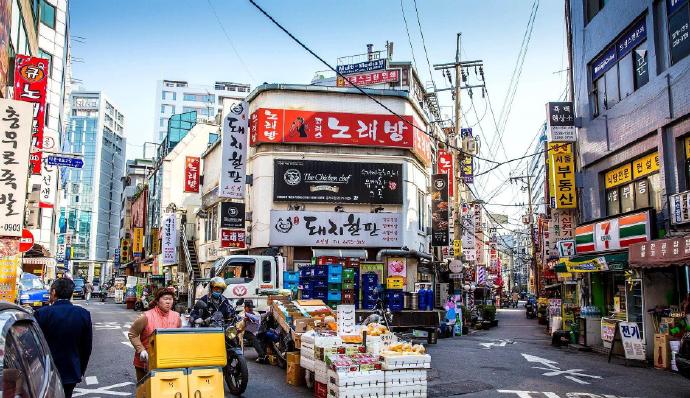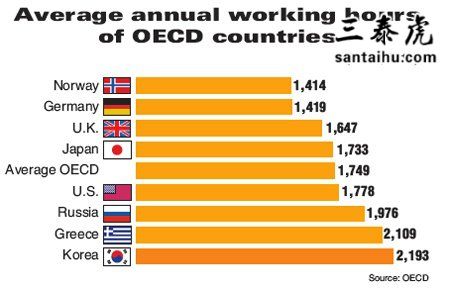What is the dark side of living in South Korea? I have heard from multiple people that the country has a huge dark side.
韩国的生活有什么痛苦之处吗?我听很多人说这个国家有很多弊端。

以下是Quora网友的评论:
Sam Choi
Koreans are exceptionally materialistic and narcissistic; you can see women walking down the street staring at themselves in mirrors and women constantly looking at themselves in mirrors on subways and applying makeup while sitting on the bus, or at a restaurant. Meanwhile, elders are digging through trash piles for boxes. Kids go to school from 9am to 9pm or later. Teens get plastic surgery then die by suicide.
韩国人特别物质,特别自恋;女人走在街上也会盯着镜子里的自己看,在地铁里不停地照镜子,在公共汽车上或在餐馆里化妆打扮。但长辈们却在垃圾堆里翻找纸箱。孩子们从早上9点上学习到晚上9点,甚至更晚。青少年接受整形手术,然后自杀。
But most of all, the very often unknown dark side of Korea is that it’s so-called “miraculous” economic rise in the 1980s was hugely influenced at the expense of my own life, and many others just like me. I was born in Korea, then when I was 8 years old, my mother and father told me to wait at a market for them to return. That’s about all I remember, except that they never returned. The ironic and tragic part is that I very clearly remember my grandmother told me earlier that day that we were going on a trip to another country. That sounded very strange to me.
韩国不为人知的罪恶在于,韩国在20世纪80年代经历了所谓“奇迹般”的经济崛起。我出生在韩国,我8岁时,父母让我在市场等他们回来。我只记得这些,但他们再也没回来。但十分讽刺、非常悲剧的是,我非常清楚地记得那天早些时候,祖母曾告诉我,我们要去另一个国家旅行。这听起来非常奇怪。
I then spent the next couple of years being abused at an orphanage although I was not an orphan. I was adopted when I was 12. It was not easy. I was so traumatized that I did not speak for nearly one year, and it was not easy trying to learn a new language plus not knowing what the hell happened. This may sound like a rare and isolated incident, but I am not alone. Over 250,000 children as myself were born in Korea and shipped overseas so Korea could profit. 250,000 children that we know of - there are likely many more.
接下来的几年里,虽然我不是孤儿,但我却在孤儿院受尽虐待。12岁时我被人领养,我觉得日子太难了。我遭受了很大的创伤,有将近一年的时间都不肯说话,而且学习一门新语言并非易事,我感到茫然不知所措。我并非个例。有超过25万儿童像我一样,在韩国出生,被送往海外,韩国借此获利。25万只是我们知道的数字,实际可能还有更多。
Korea made $20 to $40 MILLION US DOLLARS every year from exporting me and other children to foreign countries. Many were deported back to Korea. Many died by suicide. Many were adopted by people in Europe and the US who were lied to by Korea. Korea falsified our records including our birthdates and names. It’d be nice if people knew the truth. It’d be great if Korea acknowledged this is how they had an economic turnaround: by exporting their own which Bryant Gumbel acknowledged in 1988:
韩国通过每年从向国外输送儿童,赚取2000万至4000万美元。许多人被遣返回韩国。许多人死于自杀。许多儿童被受到韩国蒙骗的欧洲人和美国人收养了。韩国伪造了我们的出生日期和姓名。如果人们知道真相就好了。如果韩国承认这是他们经济发展的手段,那就太好了。布莱恩特·甘贝尔在1988年承认:
JANE KIM
I was born in South Korea and still living here for 19 years.
As a high school student, I could feel the dark side of our country more intensely.
The education is killing the students
If you ask South Korean students: How much do you study?
High school students: at least 12 hours(regular course) or up to 20 hours
middle school students: at least 8 hours (regular course) or up to 14 hours
elementary students: at least 6 hours (regular course) or up to 14 hours
我出生在韩国,在这里生活了19年。
作为一名高中生,我能更强烈地感受到我们国家的阴暗面。
韩国的教育正在扼杀学生
你可以问问韩国学生:你要花多少时间在学习上?
高中生:至少12个小时(普通课程),甚至多达20个小时。
初中生:至少8个小时(普通课程),甚至多达14个小时。
小学生:至少6个小时(普通课程) ,甚至多达14个小时。
for me, it is okay for middle and high school students to study like that but is it normal for elementary students? I mean, I think they deserve only 6hours to study (regular school course) and enjoy like reading or hanging out with friends in the other remaining time. But as soon as the school is over, the vast majority(let's say 10 out of 8) of students go to the academy and come home late in the night(usually 8 pm -10 pm - elementary, 10pm-12pm -middle, 11pm-1am- high). Some academies end at 2 or 3 in the morning(usually for high school students). But do you know the sincere reason why they are studying like this?
对我来说,初中生和高中生还能撑得住,但小学生这样学习正常吗?在我看来,小学生一天只需要花6个小时学习就够了(常规学校课程),然后可以用剩下的时间进行阅读、和朋友一起玩。但实际上,学生们放学后,绝大多数(大概80%)会去补习学校,晚上很晚才能回家(小学生们通常要到晚上8点-10点,初中生们要到10点-12点,高中生们要到11点-半夜1点)。有些补习学校甚至要到凌晨2点或3点才结束(通常是针对高中生)。但是你知道他们这么刻苦学习的真正原因吗?
Right now, the unemployment crisis is true, severe. So only selected students, who have the top career can survive in this competitive world. There are three top universities; Seoul National Uni., Yonsei Uni., and Korea Uni. Students are desperate to enter at least one of them. All of the students are studying hard because this is a matter of their future and living. So they risk their lives in studying. I'm sure some of the people have seen news of suicide in South Korea. Yes, South Korea ranks the first in the suicide and the lowest in the happiness. But this is an obvious result because who will be thrilled with joy and full of happiness while you are studying like a machine does? Every day, we go to school and every day we study and study and study until the lights go off from one building to another one. We cry while to study and if there are moments when we don't want to study, we began to worry about the future that we are supposed to face. We think about whether to suicide because of the momentous burdensome of the studying and concerns of no happiness even when we reach universities. Students study without any emotion for nearly 12 years (until the age of 19 or more) and enter universities.
因为现在韩国的失业危机太严重了因此,只有经过层层筛选的学生,拥有光鲜职业的人才能在这个竞争激烈的社会生存下来。韩国有三所顶尖大学:首尔国立大学、延世大学和高丽大学。学生们削尖了脑袋想进入其中之一。所有的学生都在努力学习,因为这关系到他们的未来和生活。所以他们冒着生命危险拼命学习。
有些人在韩国会看到自杀的新闻。是的,韩国人的自杀率排名全球第一,幸福感上排名最低。当你像机器一样学习时,怎么可能有兴奋感和幸福感呢?我们每天去学校,每天学习,学习,学习,直到整栋楼的灯慢慢熄灭。如果觉得疲惫、不想学习,我们就会立刻为未来感到焦虑。我们有了自杀的念头,因为我们担忧学习负担太过沉重,即便升入大学也不会有幸福。学生们变成学习机器,麻木地学习近12年,然后进入大学。
I hope one day the educational curriculum would change from ' compulsory education ' to ' voluntary education' which students can learn things that they prefer and make them feel happy and joy while studying.
我希望有一天韩国的教育可以从“义务教育”变成“自愿教育”,学生可以学习自己喜欢的东西,在学习中感受到快乐。
Christian Bergland
Originally Answered: What is the dark side of living in South Korea?
Would you rather live in boring heaven, or exciting hell?
This, an oft repeated phrase within the Korean expat community, is the choice that many Koreans feel they have to make when it comes to whether they stay in their home country or look abroad for opportunity. Korea is one of the most densely populated countries in the world.
在韩国生活有哪些痛苦之处?
你是愿意生活在无聊的天堂,还是生活在刺激的地狱?
这是韩国侨民圈子里经常被提及的一句话,也是很多韩国人在选择留在国内还是出国寻找机会时必须做出的选择。韩国是全球人口最稠密的国家之一。
People live on top of each other in small apartments with prices that often make Manhattan prices look reasonable. Renting is expensive, and securing an apartment requires putting up a down payment (known as key money) in the tens of thousands of dollars for a one bedroom, and often in the hundreds of thousands of dollars for an apartment suitable for a family (yes, for a rental).
人们住在面积狭促的高层公寓里,这些公寓的价格往往能把曼哈顿的房价衬得合理起来。韩国的房租很贵,要想租到一套公寓,就需要支付首付(也就是所谓的“钥匙钱”),一套一居室公寓的首付可能高达数万美元,而一套适合家庭居住的公寓通常更是需要支付数十万美元(没错,只是租房)。
You get the point? Korea's population density means that it's very difficult to escape people, and the downtown of a Seoul suburb will often be as crowded as Times Square. To add to all this, Koreans also have the third highest working hours in the OECD after Mexco and Costa Rica, and it's not particularly close to countries of the West
明白了吗?韩国的人口密度之高意味着人们很难逃离人群,首尔郊区的商业区和时代广场一样拥挤。除此之外,韩国人的工作时间在经合组织成员国中排名第三,仅次于墨西哥和哥斯达黎加,而且与西方国家的差距较大。

So getting back to that opening statement, would you rather live in boring heaven, or exciting hell? Korea offers the latter. Life moves swiftly, new buildings are constantly being built, nightlife and restaurants are endless, sin taxes are almost unheard of. Korea is an incredible place to be young. But once you get older, once you have a family, do you really want to live in 800 square feet, hustling so you can afford housing and education for your children? Do you want to be putting those children through the wringer that is the Korean education system?
你是愿意生活在无聊的天堂,还是生活在刺激的地狱?韩国就是后者。生活瞬息万变,新建筑不断建成,夜生活和餐馆层出不穷,罪恶税几乎闻所未闻。韩国对年轻人来说是一个不可思议的地方。但一旦你长大了,一旦你有了家庭,你真的愿意蜗居在800平方英尺的房子里,为了房费和孩子的教育而奔波吗?你想让孩子经受韩国教育制度的折磨吗?
That's the dark side of Korea. The country may be rich, but life is hard, even for the wealthy. Leaving Korea means esca that, but it also means accepting a life that simply won't be as fun, exciting, or engaging as the one you left behind.
这就是韩国的阴暗面。这个国家也许很富有,但即便对富人来说,生活也不容易。离开韩国意味着逃避这些痛苦,但也意味着必须接受一种不如韩国有趣、刺激或迷人的生活。
Ken Eckert
Originally Answered: What is the dark side of living in South Korea?
在韩国生活的阴暗面是什么?
I like living here, and people are kind to me, but it is like living in a nice hotel. It is comfortable, but it is not your home. As an expat, you can never be accepted as a part of the community. I have had countless conversations with Koreans consisting of "we Koreans do/like x, whereas foreigners y." One of my biggest disappointments is how totalizing Korean identity is here, and how so few can see beyond this binary of dividing the world into Korean or foreign. It would be inconceivable in Canada for a person to constantly refer to "we Canadians," or to not only rule out but to have never tried anything but Canadian food, music, and culture, even when abroad. Here it is quite normal. Coffee cannot be consumed until it is deemed "Korean coffee"!
我喜欢住在韩国,人们待我也很友好,但我就像住在高级酒店,虽然舒适,但不是自己的家。作为一名外籍人士,你永远不可能被社区真正接受。
我和韩国人有过无数次这样的对话:“我们韩国人喜欢x,而外国人喜欢y。”最令我失望的是,韩国人的身份壁垒太强了,很少有人能超越这种将世界划分为韩国人或外国人的二元对立。
在加拿大,如果有人总提“我们加拿大人”,或者不仅排除而且从未尝试过加拿大以外的食物、音乐和文化,即使身处国外也是如此,那绝对是不可思议的。但在韩国这是很正常的行为。除非咖啡被标注“韩国咖啡”,否则是不能饮用的!
Again, I stress that this mindset is not necessarily done with meanness or arrogance. But the corollary to the binary is that Koreans are also extremely prickly about any criticism by foreigners. So I really can't make many other specific negative statements about South Korea because I place myself in danger by doing so.
我再次强调,这种心态并不一定是出于卑鄙或傲慢。但这种二元对立的必然结果是,韩国人对外国人的任何批评都极其敏感。所以我不敢对韩国发表具体的负面言论,因为这样做只会惹火上身。
此文由 三泰虎 编辑,未经允许不得转载!:首页 > 问答 » 韩国的生活有什么痛苦之处吗?我听很多人说这个国家有很多弊端
 哪个国家和中国更像,越南、韩国还是日本
哪个国家和中国更像,越南、韩国还是日本 墨西哥的人均GDP略高于中国,两国人民的生活水平对比如何
墨西哥的人均GDP略高于中国,两国人民的生活水平对比如何 中国和韩国的差别在哪儿,一个秉持着主人心态,一个沦为别国的附属国
中国和韩国的差别在哪儿,一个秉持着主人心态,一个沦为别国的附属国 中国是如何超越韩国和日本成为显示面板制造业的领导者的
中国是如何超越韩国和日本成为显示面板制造业的领导者的 生活在美国好,还是生活在印度好
生活在美国好,还是生活在印度好 澳大利亚、日本、韩国等国在印度投资有什么好处,发达国家为什么要投资印度这样的发展中国家
澳大利亚、日本、韩国等国在印度投资有什么好处,发达国家为什么要投资印度这样的发展中国家 为什么韩国在国际外交上完全丧失了尊严
为什么韩国在国际外交上完全丧失了尊严 韩国人后悔弃用汉字吗
韩国人后悔弃用汉字吗